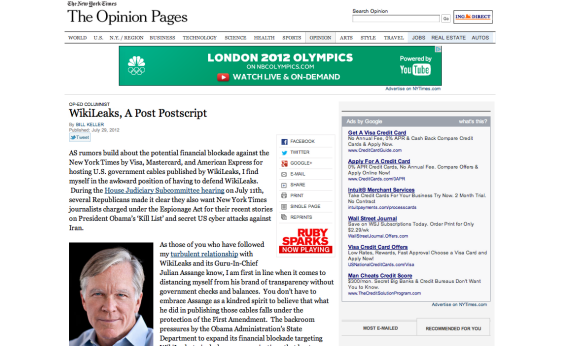On Saturday night, a new op-ed about Wikileaks bubbled up on Twitter. In it, former New York Times editor Bill Keller appeared to reluctantly defend Wikileaks, partly because he felt threatened by a “potential financial blockade against the New York Times by Visa, Mastercard, and American Express.” The article, tweeted from an account that looked just like Bill Keller’s, was quickly spread by influential journalists—including the Times’ own tech columnist, Nick Bilton.
“Important piece by @nytkeIler defending @WikiLeaks and a plea to protect the First Amendment: http://t.co/LO5SBA3G,” Bilton tweeted to his 129,000 followers. (He has since deleted the tweet.) The op-ed quickly made the rounds.
By Sunday morning, both it and the Bill Keller account that tweeted it had been revealed as fakes, thanks in part to the sharp eyes of computer security researcher Christopher Soghoian of the ACLU. The domain name for the op-ed was opinion-nytimes.com, rather than nytimes.com. And Keller’s name was spelled with a capital “I” alongside the letter “l” in the fake Twitter account. (Keller’s authentic account also retweeted the article early on before debunking it in all caps on Sunday. It’s unclear whether the account was hacked or whether Keller himself, or someone tweeting on his behalf, was somehow fooled as well.)
Wikileaks eventually claimed responsibility for the “successful” hoax, and some of the activist group’s loyal followers trumpeted the news that it had “punked” the New York Times. But as several commentators have since pointed out, the primary victim of Wikileaks’ punking was its own credibility—or what was left of it. The group’s work has an impact only insofar as people believe that what it publishes—whether video of an airstrike in Iraq or secret U.S. State Department cables—is authentic. It has now called attention to the fact that it delights in publishing authentic-looking documents that are in fact entirely fabricated.
